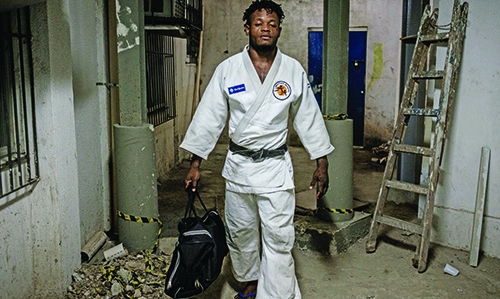Refugee fights way into Olympics
Rio de Janeiro: Ferocity may sound like a good thing in martial arts, but when Popole Misenga started training for his Olympic judo team he was, well, too ferocious -- “brutal,” one coach says.
Then again, Misenga’s no ordinary athlete and his team -- composed of refugees from around the world -- is no ordinary squad.
The Congolese judoka is pushing to compete in the Rio Olympics this August as part of the Games’ first stateless team, drawn from conflicts around the world to give hope to the dispossessed.
As a child of the Democratic Republic of Congo’s 1998-2003 war, which killed millions and left many more homeless, the 24-year-old has been hardened by terror, hunger, and desperation.
And when he first trained in Brazil, where he sought asylum, his fellow black belts didn’t know how to deal with him.
“He was very brutal,” said Geraldo Bernardes, the veteran Brazilian coach of four Olympic teams, who now oversees Misenga and other hopefuls at the Instituto Reacao, a Rio de Janeiro NGO and training facility founded by Olympic bronze medalist Flavio Canto.
Bernardes says the refugee, who has short dreadlocks and a massive chest, caused a rift at the club, where judo’s values of mutual-respect rule supreme -- and where the Brazilians had trouble relating to his tragic story.
“There was a hostile atmosphere,” the grizzled trainer said. “He injured several athletes.”
But that was a year ago and Misenga, who lives in a Rio favela with his Brazilian companion Fabiana, their one year old son Elias and her other three children, has mellowed.
After all, making the shortlist for the refugee team indicates his luck has finally turned.
Violent road to Rio
Misenga learned judo in a refugee camp after fleeing the eastern DRC region of Bukavu, where violence continues to this day despite the end of the war.
His mother died, he never knew the whereabouts of his father and he’d been separated from his two sisters and brother. He remembers as a small boy having to flee alone into the forest.
Misenga shot through the judo ranks, becoming DRC national champion, but he says the sport turned into a kind of slavery that couldn’t fill the gaps left by war.
“My life was to train, train, train, train, train. All I thought about was how to win,” he said. “I was sad and nervous.”
And the training methods were brutal -- helping to explain the refugee’s style on the judo mat.
“They were trained to win at all costs,” Bernardes said as Misenga got ready for another session of sparring in Rio.
“When they didn’t win they were locked in a cell with food rations cut in half for several days.”
In 2013, Misenga, who competes in the under 90 kilogram category, went to Rio for the World Judo Championships. His food vouchers were stolen by corrupt team officials and he lost in his first bout. That was the final straw.
Not speaking a word of Portuguese, penniless, and an ocean away from home, Misenga and a female Congolese judoka, Yolande Mabika, ran away, eventually finding shelter with fellow Africans in the Bras de Pina favela.
“It was very complicated,” Misenga said quietly. “I had no place to sleep, nothing to eat, no work.”
Local hero
A Rio favela like Bras de Pina might not seem like the luckiest place for a refugee to wind up.
Drug gangs control the alleys around Misenga’s apartment where he, Fabiana and the four children share a single airless bedroom and a tiny kitchen with a sofa.
A barricade blocks one end of his street and several bullet holes mark the wall of his building. Garbage and condoms litter the ground.
“There’s no war as there is back home, but there are drug traffickers. The bandits shoot and the police shoot,” he said.
But while favelas suffer high crime, they are tight-knit and locals in Bras de Pina clearly revel in the presence of their unusual neighbor, calling out “Popole!” as Misenga walks proudly down the street.
“He’s like the Hulk, you know,” one admiring man said. “He’ll beat everyone.”
Being accepted on the International Olympic Committee’s shortlist for the refugee team means Misenga gets a stipend, so he can give up the construction jobs he did to make ends meet. He can eat properly.
He also gets Portuguese lessons, hoping to learn to become a forklift operator for when sport stops paying.
And a huge smile spread across Misenga’s face as he watched Elias play in the dust. “He’s very strong. He’s going to be a fighter,” Misenga said.
One day, maybe Misenga will even find his siblings.
“He dreams of bringing them to Brazil,” Fabiana said.
Lucky few
To get to the Reacao gym from the favela means a tiring cross-town journey of at least two hours and three buses. After training, late at night, Misenga makes the same journey in reverse.
At the gym, Misenga can cut a lonely figure. His uniform, called a judogi, is far from the newest and he is left out of the chatter between Brazilian athletes who have known each other for years.
But Bernardes said the refugee fighter has made big strides, especially regarding the “solidarity” that judo teaches.
At the start of June the IOC’s shortlist for the stateless team is expected to be cut to between five and 10 people, based on sporting level, refugee status and personal history.
Other prominent candidates include Yusra Mardini, a Syrian swimmer, who reached Europe in a perilous boat journey across the Mediterranean. Misenga’s fellow Congolese, Mabika, is hoping to represent women’s judo.
The lucky few will parade at the opening ceremony under the Olympic flag -- and Misenga knows who he’ll be fighting for.
“I’ll be representing all the refugees of the world.”
Related Posts

